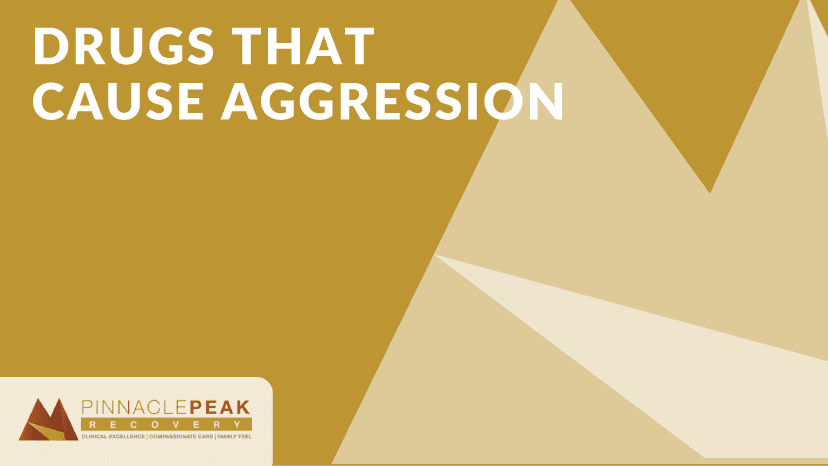Your friend used to be one of the most chill people you knew. You respected how they rarely lost their head, even in situations that you would. That didn’t mean they never got upset about things, but they always seemed to have their emotions under control.
Recently though, you started noticing a change in their behavior. They’ve been on edge, even small inconveniences making them get huffy and puffy. They snapped at someone who just looked at them wrong. This isn’t the friend you know. You tried bringing it up with them, asking if they were okay or if they needed to talk, but they brushed you off.
You decided to go home and google what can cause such a change in behavior. It feels like something beyond stress. You see various results like BPD or depression, but one in particular catches your eye. There are drugs that cause aggression – could that be the case?
At Pinnacle Peak Recovery, we know that there are many aspects of substance use that aren’t well-known. Part of eliminating the stigma around substance use disorders is furthering education about how it impacts people. With our master’s level physicians on staff, we believe in using our knowledge to provide easy-to-access information to our community. We want you to be able to make informed decisions about your health. Today we’re going to look at how substance use can impact more than just your physical state, but your emotions as well.
What Is the Connection Between Drugs and Aggression?
One of the reasons people don’t always note emotional or behavioral changes as a side effect of substance use is the lack of understanding of how it occurs. There are many side effects of substance use that are lesser-known, usually because they are caused by other sources. For example, if someone started throwing up, you know that it isn’t just random and has to have a cause. If someone gets angry at you, however, the cause could just be them having a bad day or not getting enough sleep instead of having a stomach bug or eating some expired food.
So how exactly do substances cause aggression?
Many substances directly impact some of the chemicals produced in your brain. Dopamine is one such chemical that is often altered by stimulants and other substances. Dopamine is the “reward chemical” that is produced when we do things such as eat or have sex. It makes us feel good. Most of the time, this excess dopamine makes people feel happy while they’re using the substance of their choice. But because most substances also impact the central nervous system, things like startle responses or our “fight-or-flight” reflexes are activated as well. Additionally, inhibitions are lowered and decision-making is compromised. This means we may be quicker to anger or aggression when provoked.
Any substance that modifies chemicals in the brain or the functioning of our central nervous system has the ability to cause aggressive behavior.
The Different Forms of Aggression Caused By Drugs
The ways aggression presents itself can vary depending on the individual. Some things that might impact how it manifests include their environment, the substances in their system, their personal history with aggression, and many other factors.
When someone is experiencing drug-induced aggression, it doesn’t make the aggression any less real. The reasons and source of the aggression, however, can be the “less real” aspect as it is influenced by either the substance itself or the side effects of the substance culminating into a reaction. Let’s give an example of that.
Methamphetamines are known to have the potential to cause hallucinations. The side effect here is hallucinations, but something within the hallucination could cause a person to react aggressively. Another example would be someone who’s drunk being more reactionary than usual because of their lowered inhibitions or current perception of their reality.
Aggression can be outward or inward, physical or verbal.

How Do Drugs Affect a Person’s Behavior?
Substances impact multiple areas of your body, your brain, and your behaviors. The way a substance might impact your behavior will vary depending on the specific substance you’re taking. While not all substances are known to cause behavioral changes, there is a large enough portion that does. Let’s take a closer look at some of the specific ones.
The Effects of Stimulant Drugs on Behavior
Stimulants “stimulate” your system. This normally encourages your body to do more than what it normally does, with common physical side effects being high blood pressure and high heart rate. Some well-known stimulants include cocaine, Adderall, and methamphetamines.
There are two primary ways that stimulants impact a person’s behavior. One is through chemical changes that cause emotional responses, like by altering the dopamine levels in your body, and the other is through side effects like hallucinations and delusions.
When a person is regularly taking stimulants, their body can become accustomed to the feeling of having high dopamine levels. That means that when they stop taking them, the body goes into dopamine withdrawal. This loss can lead to depression or aggression depending on the individual and what other symptoms they might be experiencing.
Hallucinations and delusions can occur even outside of substance use but are more likely to occur with it. Hallucinations are visual or auditory sensations that aren’t actually there. Delusions are when a person believes something to be true that isn’t. Both of these can also occur when sudden changes in the brain occur when someone is stressed, or even due to lack of sleep. If a person is seeing, hearing, or otherwise believing something is true that isn’t there, they might be reacting to something you can’t assist them with. Sometimes hallucinations and delusions can turn violent without the onlooker knowing what the other person is experiencing.
The Effects of Alcohol on Behavior
Alcohol is fairly unique in the fact that it has the qualities of both a depressant and a stimulant. While in most cases it is primarily classed as a depressant, this still impacts how it alters a person’s behavior.
It is fairly common knowledge that people have lowered inhibitions when they’re intoxicated, but why is that? When alcohol is being processed through your system, it doesn’t just impact your digestive tract, it impacts your brain. The toxins within alcohol can alter chemicals and neurotransmitters in your brain which can cause lowered inhibitions and behavioral changes.
Depressants, as a whole, can play a large role in behavioral changes. They slow down the messages sent through your body via the central nervous system, which can impact things like reflexes and general reactions as a whole. With long-term use, people can also notice side effects such as depression or anxiety.
Over 270,000 people in Arizona, aged 12 and up, reported having an alcohol use disorder. This sort of long-term or excessive use can lead to a greater chance of side effects such as behavioral changes. These behavioral changes can come from the alcohol itself or could occur due to how alcohol use is impacting their life.
What Kind of Drug Withdrawal Can Cause Aggression?
When a person is going through withdrawal, they’re experiencing a myriad of symptoms due to their body adjusting to the lack of a substance in their body. It’s important to note that sometimes simply the pains of going through withdrawal can cause someone to be angry and aggressive as opposed to it being a direct result of the abuse substance being detoxed from their system.
Aggression isn’t the most common side effect of withdrawal, but it’s a significant one.

Managing Aggression While Getting Treatment at Pinnacle Peak Recovery
Mental illnesses and substance use often go hand in hand. While aggression itself is not normally labeled as a mental illness, it’s important to note and address behavioral concerns while going through recovery, too. Substance use impacts almost every facet of a person’s life, including the lives of those around them. When you address multiple areas of concern instead of just one facet affected by substance use, you come out with a stronger foundation for recovery.
We know that here at Pinnacle Peak, and we also know that not every patient who walks through our doors has the same exact concerns. That’s why we work to tailor your experience to you, offering a variety of evidence-based treatment options so you can find one that works best for you. If you complete our Proven Process and return to use within a year, we will bring you back for additional treatment at no cost to you.
Recovery is out there, and aggression isn’t forever. IIf you have any questions about what we offer, how to address the side effects of substance use, or anything else, don’t hesitate to give us a call at 866-377-4761. Our Pinnacle Peak team is here and ready to help.
FAQs
What drugs can make you aggressive?
One of the most common categories of drugs that can lead to behavioral changes, such as aggression, is stimulants. This includes substances such as cocaine, meth, and even Adderall. Alcohol is also considered to be a stimulant. Any of these substances have the potential for aggression as a side effect.
Which drug is most implicated in aggressive behavior?
One of the most well-known substances when it comes to aggression is methamphetamine. This is primarily due to its other side effect of hallucinations and delusions. Because of this, a person might be more likely to lash out whether at a person or at something they believe to be there.
What drugs are used to calm aggression?
Normally depressants are considered to be the opposite of stimulants, meaning they can help with aggression in some scenarios. Be aware, however, of things like alcohol which are both a depressant and stimulant. Drugs aren’t a long-term solution for someone who needs to manage anger. If you’re looking for a way to manage an anger disorder, it’s best to speak to a doctor.

